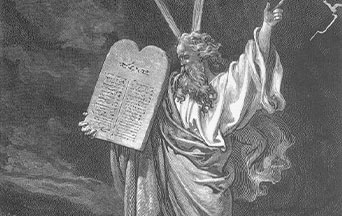
It’s official. The Ten Commandments must now be posted in Louisiana schools. The Governor Jeff Landry just signed the law that makes it mandatory.
The law reads:
“Each public school governing authority and the governing authority of each nonpublic school that receives state funds shall display the Ten Commandments in each building it uses and classroom in each school under its jurisdiction. The nature of the display shall be determined by each governing authority with a minimum requirement that the Ten Commandments be displayed on a poster or framed document at least eleven inches by fourteen inches. The text of the Ten Commandments shall be the central focus of the poster or framed document and be printed in a large, easily readable font.”
That language comes from Louisiana House Bill Number 71, a version of the bill that the Governor signed on June 19.
Eternal and Natural Law: The Foundation of Morals and Law
It is highly popular. On April 10, 2024, the House of Representatives passed it with a super-majority of 82-19. The Senate passed it 30-8 on May 16 but added some amendments for the House to approve before going to the Governor’s desk.
The passage of the law raises two vital questions. What good will the law accomplish? Will the courts allow such a law to stand? This article will discuss each in that order.
At least three arguments support placing the Ten Commandments in every Louisiana (and American) classroom.
Source of Justice, Law and Morality
The first is that the Ten Commandments are the basis of law and justice throughout Western Christian Culture. Our Lord and His followers in the early Church took them from their original context among the Children of Israel and made them universal (catholic). These are fundamental duties that all people owe to God and their neighbors. These are independent of social standing, political position or wealth. Yes, hierarchies exist and are vital to the proper functioning of society, but certain rules are so crucial that all must obey them.
Despite what some people may argue, every just statute currently on the books relates to one of God’s holy ordinances. Even in the most secular settings, human troubles usually arise from untruth, theft or unfaithfulness—or some combination thereof. Even the most trivial offense, like a parking ticket, harkens back to “You shall not steal.” Violator are, in effect, stealing the land under their cars. Only the relativistic modernist mind entertains arguments that anyone has the “right” to serve other gods, kill, commit adultery, steal or lie.
The world of “situational morality” is chaotic, which brings to mind a second reason the Ten Commandments are critically important: they are the basis of order.
Harbinger of Order
America’s schools, on the other hand, are too often gardens where chaos is the bumper crop. Sometimes, the disarray is deliberate, resulting from malformed educational theories that students learn by sorting through ambiguous ideas and situations. Sometimes, the pandemonium finds its basis in the free-for-all atmosphere that modern ideas of “tolerance” encourage. Of course, too many children carry the residue of disordered homes to school with them.
 Learn All About the Prophecies of Our Lady of Good Success About Our Times
Learn All About the Prophecies of Our Lady of Good Success About Our Times
In such cases, a posted copy of the Ten Commandments is a beacon of order. Every item in a classroom helps teach children what society expects of them. Teachers engage in such indirect instruction when they hang banners, posters and other displays. All too often, as in the case of “rainbow flags,” such items encourage disorder. Undoubtedly, the Ten Commandments can be an antidote.
Such thinking inspires a third reason for displaying the Ten Commandments. Their presence drives the leftists crazy. Such a poster weakens the case for a “value-free” classroom. This element of schoolyard malpractice goes back to the ethos of “do your own thing” and “it is forbidden to forbid.” Too many teachers advocate disobedience to the “dominant culture” with an almost missionary zeal.
The most significant conclusion of this case is its overwhelming support in an age that liberals have labeled post-Christian. There is nothing post-Christian about this bill and the overwhelming margins by which it has passed. The Louisiana Ten Commandment Bill demonstrates how the Law of God is extremely popular among the grassroots. The bill has sailed through both houses of the state legislature with huge margins.
Legislators would not vote for the Ten Commandments if they did not sense the support of constituents. In fact, only one lawmaker, Sen. Royce Duplessis (D-New Orleans), dared to speak out against the bill. Despite the propaganda of today’s postmodern culture, these essential rules maintain their exalted place in society.
The bill represents a failure of the left to push its anti-Christian agenda despite all the power of media and culture it holds. In addition, Louisiana is not the only state to call for posting the Ten Commandments. Texas, South Carolina, and Utah have also attempted such legislation to indicate how beloved the Commandments are.
10 Razones Por las Cuales el “Matrimonio” Homosexual es Dañino y tiene que Ser Desaprobado
The Ten Commandments are valid for all times, all peoples and all places. The Louisiana bill makes this very evident.

